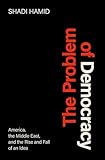The problem of democracy : America, the Middle East, and the rise and fall of an idea / Shadi Hamid.
Material type: TextLanguage: English Series: Business book summaryPublisher: New York, NY : Oxford University Press, 2022Description: 299 pages 25 cmContent type:
TextLanguage: English Series: Business book summaryPublisher: New York, NY : Oxford University Press, 2022Description: 299 pages 25 cmContent type: - text
- unmediated
- volume
- 9780197579466
- 0197579469
- Democracy -- Middle East
- Democracia -- Medio Oriente
- Middle East -- Politics and government
- Medio oriente -- Política y gobierno
- Middle East -- Politics and government -- Religious aspects
- America -- Foreign relations -- Middle East
- Middle East -- Foreign relations -- United States
- Medio Oriente -- Relaciones exteriores -- Estados Unidos
- Estados Unidos -- Relaciones exteriores -- Medio Oriente
- 321.8
- JQ 1758 H216p 2022
| Item type | Current library | Home library | Collection | Shelving location | Call number | Copy number | Status | Date due | Barcode |
|---|---|---|---|---|---|---|---|---|---|
 Libro
Libro
|
Biblioteca Juan Bosch | Biblioteca Juan Bosch | Ciencias Sociales | Ciencias Sociales (3er. Piso) | JQ 1758 H216p 2022 (Browse shelf(Opens below)) | 1 | Available | 00000193127 |
Shadi Hamid reimagines the ongoing debate on democracy's merits and proposes an ambitious agenda for reviving the lost art of democracy promotion in the world's most undemocratic regions.
Includes bibliographical references (pages [251]-284) and index.
Is democracy worth supporting? -- Democratic minimalism in theory and practice -- The problem of Islam -- Democratic dilemmas : Egypt, Jordan, Algeria -- The American veto -- Culture versus interests -- Anti-despotism or democracy promotion? -- Islamists in government -- On hypocrisy -- On power.
What happens when democracy produces bad outcomes? Is democracy good because of its outcomes or despite them? This democratic dilemma is one of the most persistent, vexing problems for America abroad, particularly in the Middle East--we want democracy in theory but not necessarily in practice. When Islamist parties rise to power through free elections, the United States has too often been ambivalent or opposed, preferring instead pliable dictators. With this legacy of democratic disrespect in mind, and drawing on new interviews with top American officials, Shadi Hamid explores universal questions of morality, power, and hypocrisy. Why has the United States failed so completely to live up to its own stated ideals in the Arab world? And is it possible for it to change? In The Problem of Democracy, Hamid offers an ambitious reimagining of this ongoing debate and argues for democratic minimalism as a path to resolving democratic dilemmas in the Middle East and beyond. In the seemingly eternal tension between democracy and liberalism, recognized by the ancient Greeks and the American founders alike, it may be time to prioritize one over the other, rather than acting as if the two are intertwined when increasingly they are not. At the end of the Cold War, the democratic idea was victorious, so much so that it took on more meaning than it could bear. Democracy became a means to other ends, whether it was liberalism, economic development, or cultural progress. What if, instead, democracy was reconceptualized as its own end? What if the people are right even when they're wrong? The problem of democracy is no longer just a Middle Eastern problem. The polarizing effects of identity, culture, and religion are now haunting the world's oldest democracies. At home, a growing number of Americans are realizing that respecting election results when the other side wins is easier said than done. To look then at the democratic dilemma abroad is to consider a deeper set of questions around why we believe democracy is good as well as whether we think it is good for other nations and cultures


There are no comments on this title.